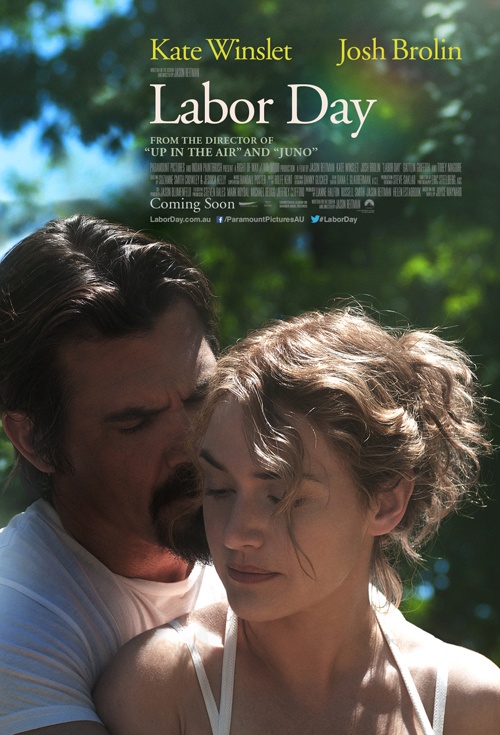 Labor Day
Labor Day
Directed by: Jason Reitman Cast: Gattlin Griffith, Kate Winslet, Josh Brolin, Clark Gregg Running Time: 1 hr 51 mins Rating: PG-13 Release Date: January 31, 2014
PLOT: Set in a quiet New Hampshire town, Labor Day is the story of single mom Adele (Winslet), her son Henry (Griffith), and Frank (Brolin), a fugitive that the two initially house against their will. As they begin to see more of his true character, he starts to fill in the role of husband and father.
WHO'S IT FOR? Those curious about a less usual kind of romance or coming-of-age story.
OVERALL
Labor Day is certainly a change of shade for writer/director Jason Reitman, who previously unearthed the humor in his American character dramas, however dark their content (such as with the dark but funny soul erosion of Charlize Theron's non-matured mean girl in Young Adult). In this tale of an unexpected family unit, he doesn't find humor but instead a thoroughly gray compassion, in a film that begins as an uneasy thriller and ends as a delicate (if sometimes too wistful) romance story, with the audience on-board nonetheless throughout its shifts.
As shown in movies like Up in the Air and Young Adult, Reitman is strong at creating sympathy for his characters, despite their often potentially disagreeable features. He finds that here with his tragic criminal, played gently by Brolin, and is able that to parallel that with the support we already have for Adele, the vulnerable introvert in the story (played with trademark strength from Winslet). Along with the presentation of Brolin's escaped convict, it is worth mentioning that the same type of care is given to the distant biological father, as played by Clark Gregg. His screentime limited until a very strong third act speech, even this archetype is given a moment to articulate his own difficult, complicated choice involving his son and his mother.
The uncertainty of character makes for a nice double feature with the movie's also dominant pure Oedipal elements, straight from the doctor's ideas about how a male understands the world through the more prudent aspect of sexuality. All comes through the eyes of young actor Griffith as well, a non-annoying kid who provides an acute representation of maturity through voyeurism; learning about strength by seeing what the adults do.
In terms of crafting this story with its own desired maturity, Reitman's latest way of bidding for the audience's attention initially comes from his jarring tone, which vamps on the audience straight-out-the-gate with a brooding atmosphere unusual to his movies. As the score of reverbing strings begins to tick with churns of crashing waves, Reitman shows to be pretty tactful with the creation of tension, which becomes his primary tool throughout the changing story. As the title day looms over its characters to create its own type of dread, the story's events are anxiously unpredictable. With the natural presentation of its characters as well, Labor Day begins as a nightmare, but with skill craftsmanship becomes a nightmare of a dream ending.
Reitman can exhibit such distinct grace in the creation of his tension that his sloppy choices of significantly less subtlety stand out even more. A pie baking scene, for example, is punctuated a bit too obviously when Brolin says, "Let's put a roof on this house" while placing the top of a family-bonding peach pie with Winslet, his hands on top of hers. A bit later, the brief appearance of a neighborhood boy with mental disabilities to show how close Frank is to being recognized comes off incredibly shallow, and a lazy way to provide an example of bad communication within bad parenting. And of course, there's the laugh-out-loud cameo appearance of the film's narrator, which should have been expected, but is built up with a tracking shot like a punchline. All of this being said, Labor Day is certainly not the type of film to shy away from using one of the worst problems in movies - that of conveniently timed news reports when specific characters are watching TV.
To Reitman's credit, when the film completely changes direction from its initial nightmare and has eventually has the viewer hoping for the fortification of an unexpected family, sympathy is a definitive line through these events. In an impressive storytelling achievement, Reitman is able to genuinely transition our perspective on a character from one complicated side to the other, while leaving us with a tangible feeling of being able to recognize both.
FINAL SCORE: 7/10
